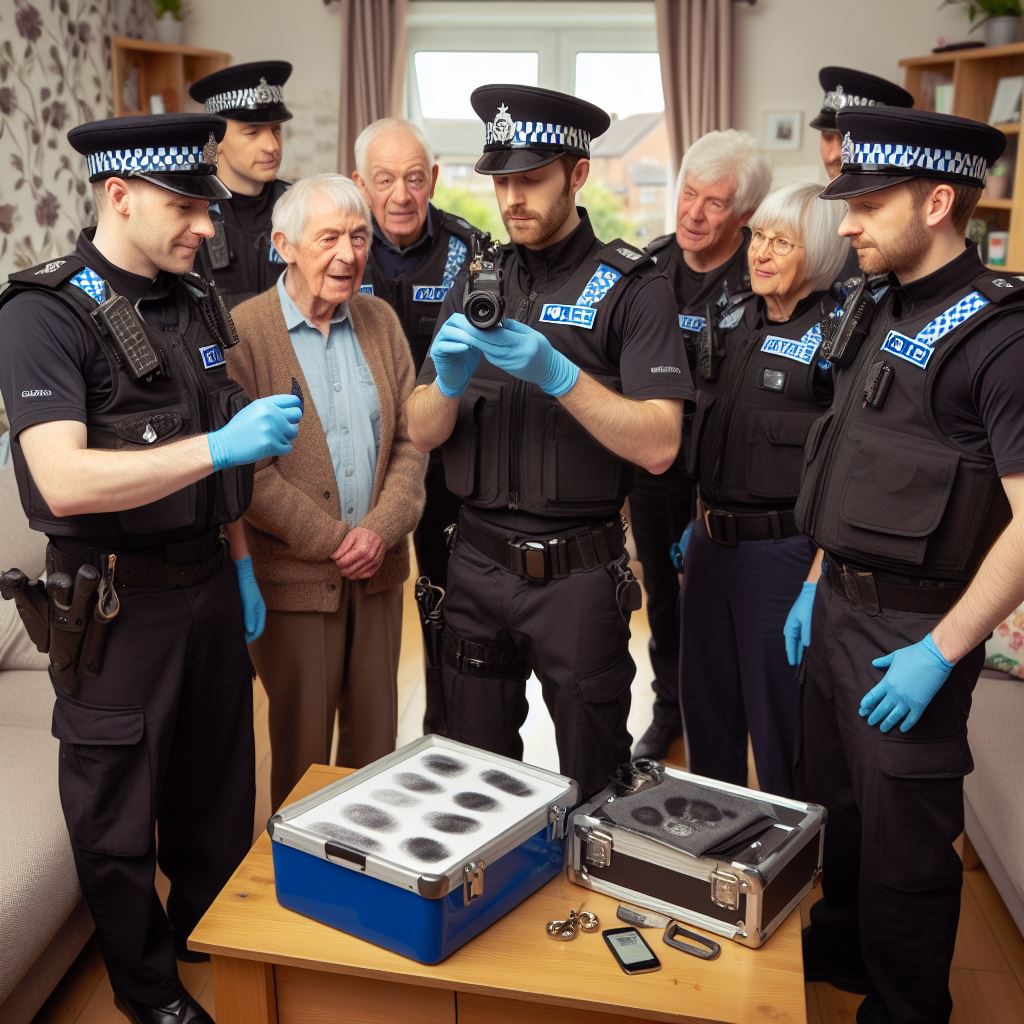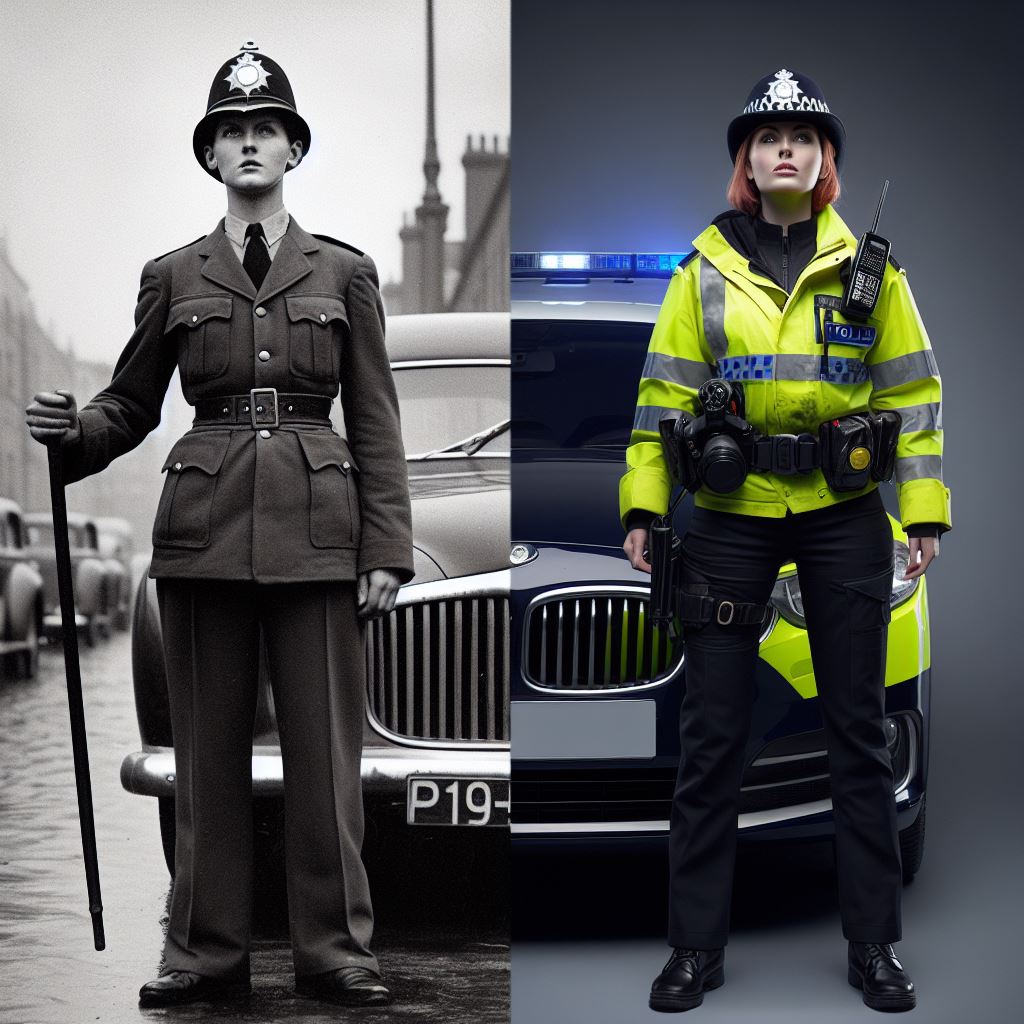Introduction
In the realm of law enforcement, the role of a UK Police Officer stands as a cornerstone of maintaining public safety and upholding the rule of law.
These dedicated professionals play a pivotal role in safeguarding communities, preventing crime, and ensuring that justice is served.
In essence, the role of a UK Police Officer is multifaceted and demanding, requiring dedication, resilience, and a commitment to public service.
However, the importance of maintaining a healthy work-life balance should not be underestimated.
Striking this balance not only safeguards the well-being of police officers but also enhances their ability to serve their communities effectively.
As we explore the intricacies of policing in the sections to come, let us continually recognize the significance of equilibrium in fostering a sustainable and fulfilling career in law enforcement.
Challenges faced by UK Police Officers
Being a police officer in the UK is not an easy task. The job comes with numerous challenges that officers have to face on a daily basis.
In this section, we will explore some of the most significant challenges faced by UK police officers.
The demanding nature of the job
Being a police officer requires mental and physical strength. Officers often find themselves in challenging and dangerous situations that test their abilities and resilience.
Whether it’s dealing with violent suspects or investigating complex crimes, the job demands constant alertness and quick decision-making.
This demanding nature of the job can lead to exhaustion, both mentally and physically.
Long working hours and shift patterns
- Police officers work around the clock to ensure public safety. This means they often have to work long hours and irregular shift patterns.
- Night shifts, weekend duties, and overtime are common in their schedules.
- Erratic schedules can disturb personal lives, strain relationships, and hinder achieving a work-life balance.
High levels of stress and pressure
- The nature of police work exposes officers to high levels of stress and pressure.
- They have to deal with emergencies, defuse tense situations, and make split-second decisions that can have serious consequences.
- The responsibility of maintaining public order and enforcing the law can weigh heavily on their shoulders.
- This constant pressure can lead to physical and mental health issues if not effectively managed.
Emotional toll of difficult situations
- Police officers often have to face traumatic and distressing situations in the line of duty.
- They are exposed to crimes, accidents, and situations that can be emotionally challenging to handle.
- Witnessing violence, dealing with victims, and encountering human tragedy can take a toll on their emotional well-being.
- It is crucial for officers to have access to proper support systems and resources to cope with the emotional impact of their work.
In short, the challenges faced by UK police officers are multifaceted.
The demanding nature of their job, long working hours, high levels of stress, and the emotional toll of difficult situations are just a few examples.
Supporting officers in managing pressures is vital for their well-being and must be acknowledged.
Read: Policing and Legal Rights in the UK Explained
Personalized UK Career Consulting
Receive tailored career guidance designed just for you. Get actionable steps and expert support to boost your career in 1-3 days. Take control of your career now.
Get StartedStrategies for achieving work-life balance
The significance of setting boundaries
In the intricate dance of life, setting boundaries emerges as a crucial strategy for achieving work-life balance.
Acknowledging the importance of clear boundaries empowers individuals to adeptly navigate their professional and personal demands.
- Prioritize personal time, safeguarding it from work commitments, and preserving moments for self-care and relaxation.
- Designate physical spaces that signify the boundary between work and personal life.
- A dedicated workspace can enhance focus during work hours and facilitate detachment during leisure time.
- Schedule dedicated time for family and hobbies, treating these commitments with the same importance as professional obligations.
- Set achievable goals that align with personal and professional priorities. Unrealistic expectations can lead to overcommitment and stress.
- Regularly assess workload and commitments. Adjust boundaries and priorities as needed to maintain equilibrium and prevent overload.
The importance of time management
Effective time management is a cornerstone in achieving work-life balance.
Police officers, facing dynamic and unpredictable workloads, must employ strategies that optimize their time.
- Identify and prioritize tasks based on urgency and importance to focus on high-impact activities.
- Delegate tasks when possible, empowering colleagues and ensuring a more equitable distribution of responsibilities.
- Leverage technology for efficient communication and task organization, streamlining processes and saving valuable time.
- Use time-management techniques like the Pomodoro Technique, breaking work into intervals to boost focus and productivity.
The value of support networks, both at work and home
- Having a strong support system is crucial for managing the demands of being a police officer.
- Build and nurture relationships with colleagues who understand the challenges you face.
- Similarly, seek support from family and friends who can provide emotional and practical assistance.
Benefits of seeking professional help or counseling if needed
- In some situations, you may find it beneficial to seek professional help or counseling.
- This can provide you with a safe space to discuss any work-related stress or personal struggles.
- Professional support can equip you with coping mechanisms and strategies to maintain balance and well-being.
- Counseling aids in clarifying thoughts and emotions, leading to improved decision-making.
- Clear-headed decision-making positively impacts both professional and personal spheres.
- The benefits of counseling extend to personal relationships.
- Improved mental well-being positively influences interactions with family and friends, fostering stronger connections.
Address the need to maintain physical and mental well-being
- Prioritize self-care and ensure you take care of your physical and mental well-being.
- Engage in regular exercise, eat a balanced diet, and get enough sleep.
- Practice stress-management techniques, such as meditation or mindfulness, to rejuvenate your mind and reduce work-related stress.
By implementing these strategies, you can improve your work-life balance and overall quality of life.
Remember that finding balance is an ongoing process, and it may require adjustments from time to time.
However, with commitment and perseverance, you can successfully juggle the demands of being a UK Police Officer while enjoying a fulfilling personal life.
Read: How UK Police Work with the Community

Flexibility and alternative work arrangements
Different types of work arrangements in UK policing
In the UK policing system, there are various types of work arrangements that officers can choose from
- Standard full-time: Officers work a fixed number of hours each week, usually in shifts.
- Flexible work hours: Some forces offer flexitime where officers have more control over their shifts.
- Part-time roles: Officers can opt for reduced hours, allowing them to balance work and personal life.
Possibility of flexible work hours or part-time roles
Having the option of flexible work hours or part-time roles can greatly benefit police officers
- Improved work-life balance: Flexibility allows officers to spend more time with family and engage in personal activities.
- Reduced stress: Being able to choose working hours can help alleviate the pressure of juggling work and personal commitments.
- Enhanced job satisfaction: When officers have control over their schedules, they are more likely to be content with their roles.
Importance of taking advantage of available options
It is crucial for police officers to take advantage of the available options to maintain a healthy work-life balance
- Utilizing flexible work hours: Officers can request specific shift patterns that align with their personal needs.
- Exploring part-time roles: Some officers may choose to reduce their hours for a temporary or permanent period.
- Communicating with supervisors: Open conversations with supervisors can lead to mutually beneficial arrangements.
Challenges facing flexibility and alternative work arrangements
Although flexibility and alternative work arrangements offer numerous advantages, there may be certain challenges
- Operational demands: Policing can be unpredictable, and certain roles may require full-time commitments.
- Limited availability: Flexible options may not be feasible for all officers due to staffing constraints.
- Career progression implications: Choosing part-time roles may impact promotional opportunities in the long run.
In essence, UK police officers have the opportunity to choose from various work arrangements in order to establish a healthy work-life balance.
Flexible work hours and part-time roles can significantly contribute to their well-being and job satisfaction.
Your Dream Job Starts with a Perfect CV
Get a tailored CV and cover letter that captures your unique strengths and stands out in your industry. Let us help you make an unforgettable first impression.
Get StartedIt is essential for officers to embrace these options while being aware of the potential challenges and limitations that may arise.
By recognizing the importance of work-life balance and utilizing available resources, officers can effectively balance their professional and personal lives in the demanding field of policing.
Read: The Challenges UK Police Officers Face Daily
Find Out More: UK Political Parties: A Career Overview
The role of employer support
When it comes to balancing work-life as a UK police officer, the responsibility falls on the police force.
The organization plays a crucial role in promoting and supporting work-life balance for its officers.
Responsibility of the police force
In fostering a healthy work environment, the police force plays a pivotal role in ensuring officers can achieve a meaningful work-life balance.
Police must prioritize personnel well-being with strategies for a harmonious work-life balance.
- Prioritize Mental Health Resources: Police must prioritize mental health resources, providing counseling, support, and programs for officers’ unique stressors.
- Promote Flexible Work Schedules: Promote flexible work schedules for officers, accommodating personal needs and balancing work and family commitments.
- Implement Wellness Programs: Establish comprehensive wellness programs that address physical health, nutrition, and fitness.
A healthy body contributes to a healthy mind, fostering overall well-being. - Offer Family Support Services: Recognize the importance of family support.
Provide services that assist officers’ families, acknowledging the crucial role families play in officers’ well-being. - Implement Peer Support Programs: Develop peer support programs that create a network of colleagues who can provide emotional support and understanding.
Initiatives and programs offered by police organizations
- Police forces provide flexible working arrangements, including schedules, part-time options, and job sharing, acknowledging officers’ commitments.
- Additionally, Police organizations offer EAPs with confidential counseling to help officers manage work-related stressors and personal challenges affecting their well-being.
- Some police forces provide wellness programs for officers, offering fitness resources, mental health support, and stress management workshops.
Importance of communication between officers and management
- Effective communication between police officers and management is crucial in maintaining work-life balance.
- Open channels of communication allow officers to express their needs and concerns, ensuring that their personal obligations are taken into account when scheduling duties.
- Regular feedback sessions and performance appraisals also provide an opportunity for officers to discuss their work-life balance with their superiors.
- This ongoing dialogue helps management better understand the challenges officers face and work towards creating a supportive environment.
Need for fair policies and procedures
- Fairness in policies and procedures is vital for the successful promotion of work-life balance within the police force.
- Officers need to know that their requests for flexible working arrangements or time off for personal reasons will be treated fairly and without prejudice.
- Establish clear guidelines and procedures for objective decision-making on work-life balance, considering individual circumstances and operational needs.
- Transparency and consistency in these processes enhance trust between officers and management.
To sum it all up, The police force in the UK shoulders the responsibility of promoting work-life balance for its officers.
Through initiatives, programs, effective communication, and fair policies, they strive to create a supportive work environment where officers can successfully juggle their professional and personal lives.
Recognizing the importance of work-life balance not only benefits the well-being of individual officers but also contributes to the overall effectiveness and morale of the police force as a whole
Real-life experiences and success stories
Personal anecdotes from UK Police Officers on achieving work-life balance
- One police officer shared an anecdote about how he struggled with work-life balance during his early years on the force.
- After attending a workshop on time management, he learned to prioritize his tasks, set boundaries, and delegate responsibilities.
- By implementing these strategies, he was able to spend more quality time with his family and pursue hobbies outside of work.
Examples of successful work-life management
- Another officer highlighted how she balances her work and personal life by practicing effective communication with her supervisors.
- She openly discusses her commitments outside of work and negotiates flexible working hours when necessary.
- This approach has allowed her to attend important family events and maintain a healthy work-life balance.
The lessons to be learned
- These personal anecdotes and success stories demonstrate that achieving work-life balance as a UK Police Officer is possible.
- Prioritizing tasks, setting boundaries, and effective communication are key factors in managing both work and personal commitments.
- Policemen and women can learn from these experiences to establish their own strategies for balance.
- It is crucial to remember that work should not overpower personal life and that taking care of oneself is essential.
Tips and recommendations
- Establish clear boundaries between work and personal life. Avoid bringing work-related stress into family time.
- Learn to delegate tasks and ask for help when needed. Efficient time management is crucial for work-life balance
- Communicate openly with supervisors about personal commitments and explore flexible working arrangements.
- Make time for self-care activities, such as exercising, pursuing hobbies, or spending quality time with loved ones.
- Establish a support network of colleagues, friends, and family who can provide guidance and assistance when needed.
- Practice mindfulness and stress management techniques to help cope with the demands of police work
In short, achieving work-life balance as a UK Police Officer is challenging but not impossible.
By learning from real-life experiences and success stories of fellow officers, it becomes clear that prioritization, effective communication, and self-care are essential.
Implementing these strategies and following the recommended tips can help police officers create a harmonious balance between their professional and personal lives.
Optimize Your LinkedIn for Success
Boost your LinkedIn profile with a professional bio, keyword-rich headline, and strategic recommendations that attract recruiters. Stand out from the crowd and get noticed.
Optimize NowTo sum it up, maintaining a healthy work-life balance is not only beneficial for the individual officer but also contributes to a more efficient and supportive police force overall.
Read: Understanding UK Police Ranks and Roles
Conclusion
This blog post highlighted the challenges faced by UK Police Officers in balancing work and personal life.
The demanding nature of their job can often lead to stress, exhaustion, and strain on relationships.
However, maintaining a healthy work-life balance is crucial. UK Police Officers need to prioritize their well-being and seek support when needed.
This could be through accessing mental health services, participating in stress management programs, or engaging in activities that promote relaxation and self-care.
By finding a balance between work and personal life, UK Police Officers can improve their overall satisfaction and effectiveness in their job.
They will be able to stay physically and mentally fit to handle the challenges of their profession.
In essence, work-life balance is not a luxury but a necessity for UK Police Officers. It allows them to recharge, maintain healthy relationships, and avoid burnout.
By taking care of their well-being, they can be better equipped to serve their communities and fulfill their duties effectively.
Both individuals and organizations must recognize the importance of work-life balance and take steps to support UK Police Officers in achieving it.
Ultimately, prioritizing well-being will lead to a happier, healthier, and more productive workforce.




